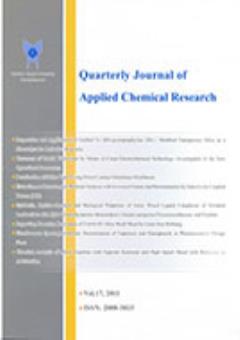Synthesized of mixed-metal MOF comprising two ligands used as a heterogeneous catalyst for Knoevenagel condensation reacti
Subject Areas : Applied Chemistry
علیرضا عباسی
1
,
Saeideh Tavakoli
2
,
Mohammad Yousefi
3
![]() ,
Moayad Hosainisadr
4
,
Moayad Hosainisadr
4
1 - گروه شیمی معدنی، دانشکده شیمی، دانشگاه تهران، تهران، ایران
2 - Department of Chemistry, Science and Research Branch, Islamic Azad University, Tehran, Iran
3 - Department of Applied Chemistry, Faculty of Pharmaceutical Chemistry, Tehran Medical Sciences, Islamic Azad University, Tehran, Iran
4 - Department of chemistry, Science and Research Branch, Islamic Azad University, Tehran, Iran
Keywords: MOF, mixed metal-organic framework, catalyst, Knoevenagel condensation,
Abstract :
A new mixed metal–organic framework [Zn0.5 Cd0.5 (NH2BDC) (4-bpmbp)].2DMF (NH2BDC = 2-amino terephthalate; 4-bpmbp = N4, N4'-bis (pyridine-4-ylmethylene)-biphenyl-4,4'- diamine DMF = N,N-dimethylformamide) (Zn-Cd-MOF) has been synthesized under solvothermal conditions using Cd2+ and Zn2+ salt, NH2BDC as a rigid ligand and 4-bpmbp as pillar ligand. The material was characterized by Fourier transform infrared (FT-IR), powder Xray diffraction (PXRD), and inductively coupled plasma (ICP) techniques. Furthermore, the catalytic behavior of Zn-Cd-MOF toward the Knoevenagel condensation reaction was investigated and good catalytic capability was achieved
1. Zhang JP, Zhang YB, Lin J Bin, Chen XM. Metal azolate frameworks: From crystal
engineering to functional materials. Chemical Reviews. 2012;112(2):1001–33.
2. Cheng S, Wu Y, Jin J, Liu J, Wu D, Yang G, et al. New multifunctional 3D porous
metal-organic framework with selective gas adsorption, efficient chemical fixation of CO2 and
dye adsorption. Dalton Transactions [Internet]. 2019;48(22):7612–8.
A. Abbasi, et al., J. Appl. Chem. Res., 18, 2, 68-80 (2024)
79
3. Abednatanzi S, Najafi M, Gohari Derakhshandeh P, Van Der Voort P. Metal- and
covalent organic frameworks as catalyst for organic transformation: Comparative overview and
future perspectives. Coordination Chemistry Reviews. 2022;451.
4. Llabrés i Xamena FX, Abad A, Corma A, Garcia H. MOFs as catalysts: Activity,
reusability and shape-selectivity of a Pd-containing MOF. Journal of Catalysis.
2007;250(2):294–8.
5. Zheng S, Li X, Yan B, Hu Q, Xu Y, Xiao X, et al. Transition-Metal ( Fe , Co , Ni )
Based Metal-Organic Frameworks for Electrochemical Energy Storage. 2017;1602733:1–27.
6. Feng M, Zhang P, Zhou HC, Sharma VK. Water-stable metal-organic frameworks for
aqueous removal of heavy metals and radionuclides: A review. Chemosphere. 2018;209:783–
800.
7. Alhamami M, Doan H, Cheng C. A Review on Breathing Behaviors of Metal-OrganicFrameworks (MOFs) for Gas Adsorption. 2014;3198–250.
8. Fanø H, Damgaard R, Bond AD, Chevallier MS, Brummerstedt B. Solvothermal
synthesis of new metal organic framework structures in the zinc – terephthalic acid – dimethyl
formamide system. 2005;178:3342–51.
9. Sun S, Huang M, Wang P, Lu M. Controllable Hydrothermal Synthesis of Ni / Co MOF
as Hybrid Advanced Electrode Materials for Supercapacitor. 2019;166(10):1799–805.
10. Klinowski J, Almeida Paz FA, Silva P, Rocha J. Microwave-assisted synthesis of metalorganic frameworks. Dalton Transactions. 2011;40(2):321–30.
11. Klimakow M, Klobes P, Thünemann AF, Rademann K, Emmerling F.
Mechanochemical synthesis of metal-organic frameworks: A fast and facile approach toward
quantitative yields and high specific surface areas. Chemistry of Materials. 2010;22(18):5216–
21.
12. Yang HM, Liu X, Song XL, Yang TL, Liang ZH, Fan CM. In situ electrochemical
synthesis of MOF-5 and its application in improving photocatalytic activity of BiOBr.
Transactions of Nonferrous Metals Society of China (English Edition). 2015;25(12):3987–94.
13. Abednatanzi S, Gohari Derakhshandeh P, Depauw H, Coudert FX, Vrielinck H, Van
Der Voort P, et al. Mixed-metal metal-organic frameworks. Chemical Society Reviews.
2019;48(9):2535–65.
14. Fan M, Yan J, Cui Q, Shang R, Zuo Q, Gong L, et al. Synthesis and Peroxide Activation
Mechanism of Bimetallic MOF for Water Contaminant Degradation: A Review. Molecules.
2023;28(8).
A. Abbasi, et al., J. Appl. Chem. Res., 18, 2, 68-80 (2024)
80
15. Zhang X, Luo J, Wan K, Plessers D, Sels B, Song J, et al. From rational design of a
new bimetallic MOF family with tunable linkers to OER catalysts. Journal of Materials
Chemistry A [Internet]. 2019;7(4):1616–28.
16. Ghasempour H, Azhdari Tehrani A, Morsali A, Wang J, Junk PC. Two pillared metalorganic frameworks comprising a long pillar ligand used as fluorescent sensors for
nitrobenzene and heterogeneous catalysts for the Knoevenagel condensation reaction.
CrystEngComm. 2016;18(14):2463–8.
17. Ghasempour H, Morsali A. Ultrasound-assisted synthesized and catalytic studies of two
nano-structured metal–organic frameworks with long N-donor ligand as a pillar. Polyhedron.
2018;151:58–65.
18. Khare R, Pandey J, Smriti S, Ruchi R. The Importance and Applications of
Knoevenagel Reaction (Brief Review). Oriental Journal of Chemistry. 2019;35(1):423–9.
19. Khare R, Pandey J, Smriti S, Ruchi R. The Importance and Applications of
Knoevenagel Reaction (Brief Review). Oriental Journal of Chemistry. 2019;35(1):423–9.
20. Li Y. Y, He T. Y, Dai R. R, Huang Y. L, Zhou X. P, Chen T, Li D. Bifunctional
Gyroidal MOFs: Highly Efficient Lewis Base and Lewis Acid Catalysts. Chem. Asian J.
2019;14(20): 3682-7.
21. Ezugwu CI, Mousavi B, Asraf MA, Luo Z, Verpoort F. Post-synthetic modified MOF
for Sonogashira cross-coupling and Knoevenagel condensation reactions. Journal of Catalysis.
2016;344:445–54.
22. Bhattacharya B, Maity DK, Pachfule P, Colacio E, Ghoshal D. Syntheses, X-ray
structures, catalytic activity and magnetic properties of two new coordination polymers of
Co(II) and Ni(II) based on benzenedicarboxylate and linear N,N’-donor Schiff base linkers.
Inorganic Chemistry Frontiers. 2014;1(5):414–25.
23. Sefidabi F, Abbasi A, Mortazavi SS, Masteri-Farahani M. A new 2D cadmium
coordination polymer based on hydroxyl-substituted benzenedicarboxylic acid as an effective
heterogeneous catalyst for Knoevenagel condensation. Applied Organometallic Chemistry
[Internet]. 2020;34(10):1–9


